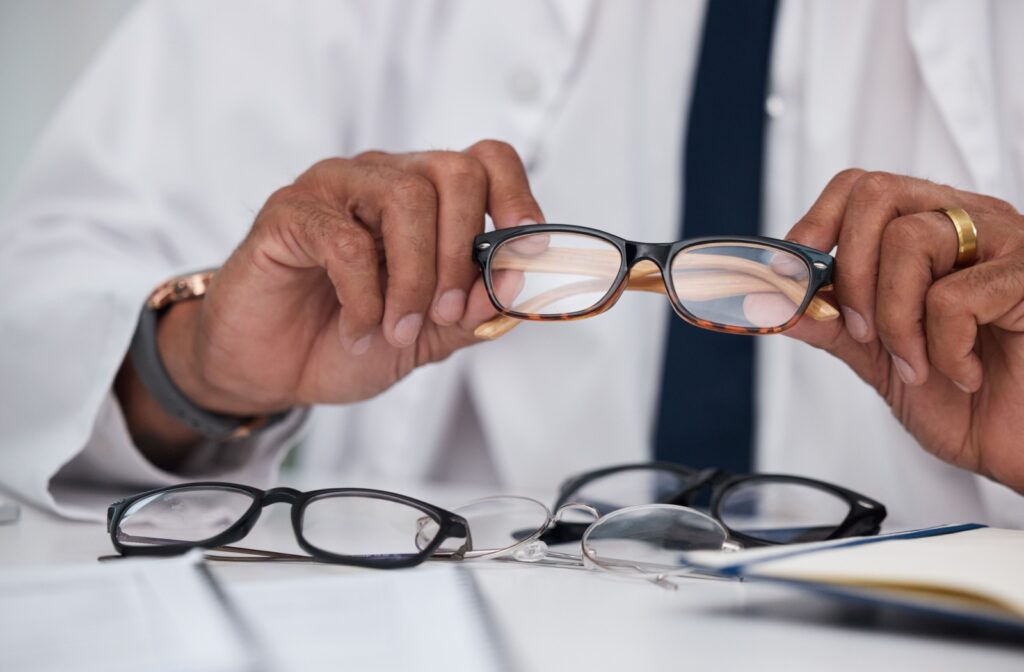If you’ve recently started wearing glasses—or if you’ve worn them for years—you might have wondered at some point: Do glasses make your eyes worse over time? It’s a common question, especially when you notice changes in your prescription. The truth is, glasses do not weaken your eyes or cause your vision to decline—they simply correct refractive errors, so that you can see clearly.
In this post, we’ll explore where this myth comes from, what glasses actually do for your eyes, and how to keep your vision healthy at any age.
How Glasses Actually Work
Glasses are designed to correct how light enters your eyes so that it focuses properly on the retina. If your eyes don’t focus light correctly, you may have a refractive error such as:
- Myopia (nearsightedness): Difficulty seeing distant objects clearly
- Hyperopia (farsightedness): Trouble seeing near objects
- Astigmatism: Blurred or distorted vision due to an irregularly shaped cornea
- Presbyopia: Age-related loss of near focusing ability
Lenses in glasses adjust the way light enters the eye, helping to bring images into sharper focus. They don’t change the physical structure of your eye—they just help you see better by compensating for your natural refractive error.
Why Some People Think Glasses Make Vision Worse
Despite the science behind corrective lenses, it’s easy to understand why this myth persists. Here are a few reasons why people may believe glasses make vision worse:
1. Your Eyes Adjust to Clarity
If you’ve been living with blurry vision, putting on glasses can feel like a dramatic improvement. Once you remove them, your normal vision might suddenly feel worse than before—even though nothing has actually changed. The contrast between clear and uncorrected vision is just more noticeable.
2. Vision Changes Naturally Over Time
Many people experience changes in their vision as they age. This is especially common with conditions like myopia and presbyopia. These changes would happen whether you wore glasses or not. In other words, glasses don’t cause vision changes—they simply help you adapt to the changes that occur.
3. You Become More Aware of Vision Issues
After experiencing what clear vision feels like, you may become more sensitive to blurry vision when you’re not wearing your glasses. But this awareness isn’t a sign that your eyesight is getting worse—it’s just a sign that you’ve gotten used to seeing better.
Do Glasses Make You Dependent on Them?
Another common misconception is that, once you start wearing glasses, you become “dependent” on them and your eyes can no longer function without them. But this isn’t how vision works.
Glasses don’t train your eyes or weaken them over time. They simply make it easier to see. If you feel more reliant on them, it’s because your vision is clearer and more comfortable when you wear them—not because your eyes are getting worse.
Can Wearing the Wrong Prescription Hurt Your Eyes?
Wearing an incorrect prescription won’t damage your eyes permanently, but it can lead to some temporary issues such as:
- Eye strain
- Headaches
- Blurred vision
- Dizziness or nausea
If you’re experiencing any of these symptoms, it’s a good idea to schedule an eye exam. Your optometrist can check for changes in your vision and ensure you’re wearing the correct lenses.
What About Eye Exercises—Can They Replace Glasses?
Some people believe that doing eye exercises can improve or even reverse vision problems. While eye exercises can be helpful for reducing eye strain or improving eye coordination, they do not correct refractive errors like nearsightedness or astigmatism.
In other words, eye exercises won’t eliminate your need for glasses. However, they can support your overall eye comfort and function—especially for people who spend long hours on screens.

How to Support Your Eye Health Naturally
While glasses don’t make your eyes worse, there are steps you can take to support your vision and overall eye health:
Follow the 20-20-20 Rule
To reduce digital eye strain, every 20 minutes, look at something 20 feet away for 20 seconds. This simple habit helps relax the eye muscles and prevent fatigue from screen use.
Eat a Vision-Friendly Diet
A diet rich in vitamins A, C, and E, plus omega-3 fatty acids, can help support long-term eye health. Foods like leafy greens, carrots, sweet potatoes, and fish are all great for your eyes.
Protect Your Eyes from UV Rays
Wearing sunglasses with UVA and UVB protection helps shield your eyes from sun damage, which can lead to conditions like cataracts and macular degeneration.
Stay Hydrated
Dry eyes can make your vision feel blurry and uncomfortable. Drinking enough water helps keep your eyes well-lubricated.
Reduce Screen Time
Prolonged use of computers and digital devices can cause eye fatigue. Try to take breaks, adjust your light, make sure to be aware of your posture.
When to See Your Eye Doctor
Regular eye exams are essential for maintaining good vision and catching any changes early. Schedule an eye exam if you experience:
- Sudden changes in vision
- Frequent headaches
- Difficulty seeing at night
- Eye fatigue or discomfort
Even if your vision seems stable, it’s a good idea to have your eyes checked annually to ensure your prescription is up to date and your eyes are healthy.
Glasses Help—They Don’t Harm
Wearing glasses is one of the easiest and most effective ways to improve your vision. Glasses don’t weaken your eyes, make you dependent on them, or cause your prescription to worsen. Any changes in your eyesight are a natural part of aging and eye development—not the result of wearing glasses.
At Precision Eye Care in Vancouver, Washington, we’re here to help you see clearly and comfortably with comprehensive eye exams, accurate prescriptions, and a wide selection of stylish frames. If you’ve noticed changes in your vision or have questions about your prescription, request an appointment today—we’re committed to your lifelong eye health.





